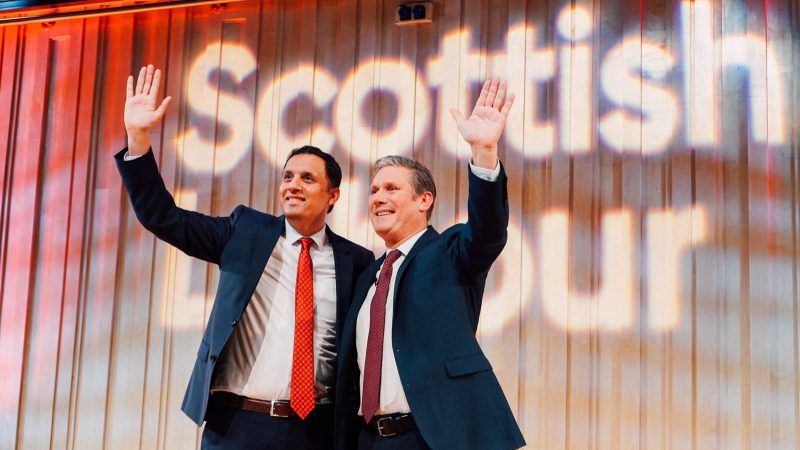
Labour is on track to gain six parliamentary constituencies in Scotland at the next general election – taking the party’s total to seven – polling has found.
In YouGov research for The Times, published on Wednesday, 45% of Scots reported that they would back the SNP in a general election. 31% said the same of Labour. Support for the Tories has fallen to 12% since the ‘mini-Budget’, which is the party’s poorest Westminster rating in any poll since February 2015.
According to the poll, Labour would increase its share of Scottish Westminster parliamentary seats to seven, while the Conservatives would lose all six of their MPs. The Lib Dems would lose one Westminster politician, winning a total of three parliamentary constituencies in Scotland.
Keir Starmer’s net favourability rating in Scotland has increased to +13, making the Labour leader more popular than Nicola Sturgeon – who scored a favourability rating of +11, up two points since the last iteration of the poll.
Commenting on the polling, Scottish Labour deputy leader Jackie Baillie said: “People across the UK are being failed by this incompetent and immoral government but there is a majority for change.
“The next electoral test in Scotland will be a general election – not a referendum – and people have a choice between a Labour government that is on your side or a Tory Government that acts in the interests of the wealthy.
“At that election, Scots have a chance to boot the Tories out of Downing Street. Change is possible but only if people choose it. Join us as we build the future, together.”
A separate Savanta poll, also published on Wednesday, found a similar decrease in support for the Tories in Scotland with the Conservatives down three points on 15% and Labour up five points on 30%.
Savanta’s political research director Chris Hopkins said the 15-point gap between Labour and the Tories in Scotland was “striking” but warned that the fact that SNP support remains strong (46%) “confirms that the Labour Party is fishing in the unionist vote pool rather than a specifically centre-left one in Scotland”.
Kwasi Kwarteng’s mini-Budget sparked widespread criticism as the pound plummeted following the announcement of a host of tax-cutting proposals, including abolishing the top rate of tax and scrapping the bankers’ bonus cap.
The Chancellor was forced into a U-turn on the top rate of tax on Monday. He claimed the policy had become a “distraction from our overriding mission to tackle the challenges facing our country” and told people that “we have listened”.
Analysis by the Resolution Foundation reported that the richest households will still gain around 40 times as much as the poorest from the mini-Budget next year despite the U-turn.
Liz Truss attempted a reset of her leadership in her speech to the Conservative Party conference in Birmingham on Wednesday. She claimed that the Labour Party, the Lib Dems and the SNP were part of an “anti-growth coalition”.
Truss told Conservative members that the government is “focused on boosting growth and opportunity across our country”, insisting that the Tories “must stay the course” as the “only party with a clear plan to get Britain moving”.
Responding to the speech, Labour’s Rachel Reeves called on the Prime Minister to “immediately reverse her government’s kamikaze Budget”.
The Shadow Chancellor highlighted that Truss has been a government minister for the past ten years, adding that the new Prime Minister “has been at the heart of building a Conservative economy that has led to the flat wages and low growth”.




More from LabourList
‘Labour won’t stop the far right by changing leaders — only by proving what the left can deliver’
‘Cutting Welsh university funding would be economic vandalism, not reform’
Sadiq Khan signals he will stand for a fourth term as London Mayor